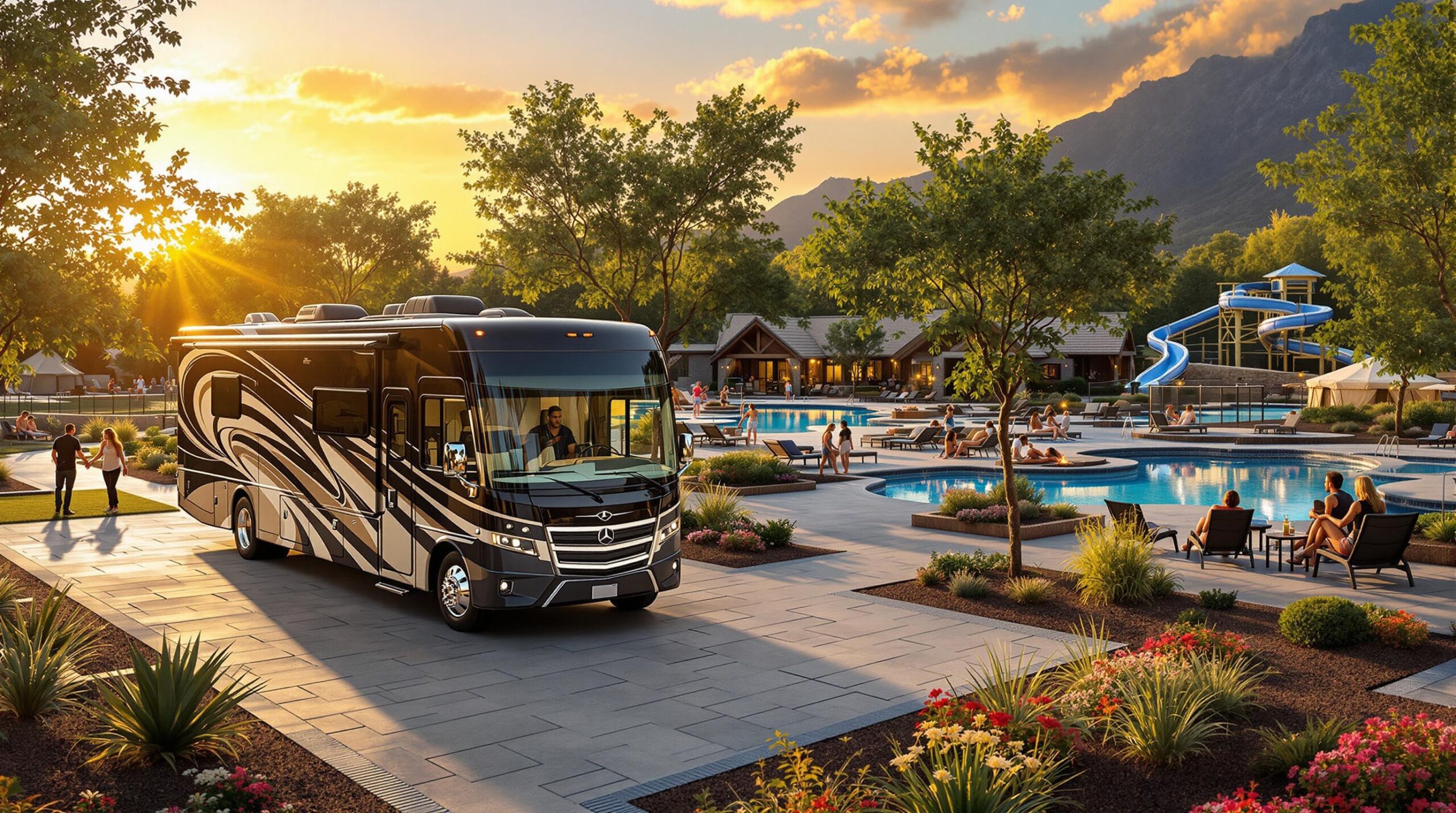Georgia RV parks are upgrading from gravel pads to resort-style destinations. Searches for luxury RV parks rose 18 percent even as overall interest fell 12 percent, according to an October study by Modern Campground and Cairn Consulting Group, the October report shows. Operators say the pivot cushions them against softening demand in the mass market.
Metro Atlanta will get its largest example with Winding Waters RV Resort, which officially opened in September 2024. The $16 million project, spread across 56 acres, features 252 pads along with cabins, vintage Airstreams and glamping tents. Guests will find a beach-entry pool with a waterslide and lazy river, pickleball and bocce courts, fire-pit areas, a dog park, and riverfront access for paddleboarding, kayaking and fishing, according to the developer’s site. “Winding Waters provides overnight and weekly accommodation options that are missing in metro Atlanta,” Reece Stead said.
The resort sits off Joe Frank Harris Parkway (US-41), just west of I-75 in Emerson, Georgia, along the Etowah River and minutes from Lake Allatoona and LakePoint Sports, positioning it to catch through-traffic and tournament families. ServisFirst Bank financed the project, while New South Construction handled site design and continues as a project partner, reinforcing lender and builder confidence in the segment.
North Georgia’s wine country is next in line. DiVine Village, proposed for 110 acres near Dahlonega, calls for 260 luxury motorcoach pads, a heated pool, multiple hot tubs, a wine-tasting room and lake views. A public hearing is set for Dec. 9, with groundbreaking targeted for early 2025, according to planning documents. “We were inspired by Dahlonega’s picturesque views, welcoming community, and inherent charm, and we intend to keep it beautifully majestic with the addition of DiVine Village,” owner Tom Petrillo said. He added, “This retreat will offer modern travelers an opportunity to experience a unique blend of adventure and relaxation while exploring Dahlonega’s many treasures.”
An established proof-point already operates in East Ellijay. Talona Ridge RV Resort houses 141 large-rig sites, a year-round hot tub, an event hall and a panoramic lookout deck. Programming ranges from live music and food trucks to yoga lessons, demonstrating that premium rates can hold in rural settings.
For park owners eyeing an upgrade, a market audit before heavy spending can be critical. Phasing improvements, starting with paved pads and reliable Wi-Fi, offers a practical approach. Owners may also consider tiered site categories to lift average daily rate without losing budget guests. Bundling gear and activities into a resort fee, hiring hospitality-trained guest-services managers, programming shoulder seasons with events to smooth occupancy, and tracking amenity ROI are additional steps; hot tubs often outperform large pools on cost versus satisfaction.
Luxury is not the only differentiator. Warthen RV Park in Washington County, a 27-acre property popular with Black Atlantans, shows how community-driven programming can widen a park’s appeal.
The demand shift has analysts urging reinvention. “Our research highlights a pivotal shift in the RV industry. While the overall search volume has decreased, the demand for luxury and long-term RV parks is growing steadily. This trend signals a clear opportunity for campground owners to rethink and enhance their amenity offerings to attract contemporary RV travelers,” Scott Bahr of Cairn Consulting Group said.
Upscale differentiation may be especially important in the South, where overall searches declined but spending potential rose, the study notes. Financing partners such as ServisFirst and builders like New South say capital is following the upgraded concept.
High-end guests also expect sustainability and seamless tech. Operators can meet those standards by installing Level-2 EV chargers at about 10 percent of sites plus one fast charger at the gate, adding solar carports to offset common-area loads, reusing greywater and planting native landscapes, deploying cloud-based property-management systems with mobile check-in, burying fiber for park-wide high-speed Wi-Fi, using motion-sensor LED path lights and app-controlled fire-pit rentals, and marketing eco-tech perks alongside pools and pickleball.
From I-75 in Emerson to the vineyards of Dahlonega, Georgia developers are betting that lazy rivers, wine rooms and EV chargers will keep high-spending travelers rolling in. Winding Waters RV Resort officially opened in September 2024, DiVine Village breaks ground in 2025, and the industry will be watching occupancy and rate performance to see whether luxury continues to drive the state’s outdoor-hospitality boom.


